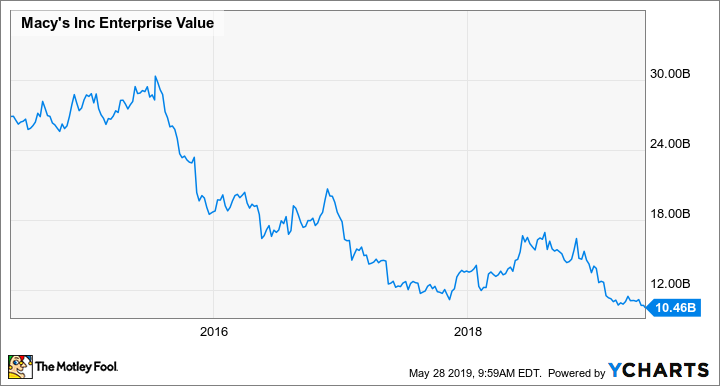Macy's (M +2.01%) was one of the few department store operators to report positive comps in the first quarter of fiscal 2019. Comparable store sales rose 0.7% year over year at the No. 1 department store company last quarter, despite a slowdown in overall retail sales growth.
This solid sales performance didn't save Macy's from getting caught up in a massive department store stock sell-off in May. Macy's shares have fallen more than 10% in the past month, due to renewed fears that the department store business model can't be salvaged.
These fears seem overblown. Macy's is in the early stages of rolling out several promising sales-driving initiatives to its stores, which could potentially lead to steady growth in the coming years. However, if this turnaround plan doesn't live up to its billing, asset sales represent an important fallback option for investors, due to the company's massive real estate value. This makes Macy's a much safer bet than a typical turnaround play.
Macy's shares plumb a new low
Shares of Macy's hit a new 52-week low last Friday, briefly falling below $21. That left the stock trading for less than seven times forward earnings. Clearly, investors are not just skeptical that Macy's can return to growth -- many think its earnings will only head lower from here.
Macy's stock still sits comfortably above the multiyear nadir of $17.41 that it reached in late 2017, another low point for investor sentiment. However, in the intervening period, Macy's has reduced its net debt from $5.8 billion to around $4 billion. As a result, Macy's enterprise value is even lower today than it was a year and a half ago, at around $10.5 billion.
Macy's Enterprise Value, data by YCharts.
This decline in the company's enterprise value is surprising given that Macy's has posted comp sales growth for six consecutive quarters, whereas comp sales had fallen for 11 consecutive quarters when the stock hit its late-2017 low. It has also left Macy's with an enterprise value well below the likely value of its real estate.
Real estate sales are slowing -- but not stopping
Over its past three fiscal years, Macy's has generated more than $1.5 billion of proceeds from selling real estate. Management has signaled that the pace of asset sales will moderate beginning this year, but the department store icon still has plenty of big real estate projects under way.
First, Macy's recently confirmed that it is seeking city approvals to build a 1.2 million-square-foot office tower on top of its Herald Square flagship store. This would allow it to capitalize on the massive value of its Manhattan real estate without having to downsize or close its highly profitable store there.

Macy's wants to build a skyscraper on top of its Manhattan flagship store. Image source: Macy's.
Second, Macy's real estate partnership with Brookfield Asset Management is kicking into high gear. Macy's and Brookfield are starting to look for tenants for new retail space that they plan to build on excess parking lot land adjacent to dozens of Macy's stores. The partners are also planning more ambitious mixed-use developments at certain Macy's properties, starting with a store in Manhasset, New York. They envision building 355 apartments as well as a hotel, offices, and additional retail space at that location.
The upside from these development projects is substantial. However, they will take years to pay off, which is why asset sale gains are moderating for now.
A huge safety net for investors
In early 2016, hedge fund Starboard Value argued that Macy's real estate was worth more than $20 billion. A late-2017 study by investment bank Cowen put the value at $16 billion (which seems like a more realistic figure).
Even that lower valuation represents a roughly 50% premium over Macy's current enterprise value. Investors seem to be downplaying the value of the company's real estate, though, due to the expected slowdown in asset sale gains. The vast majority of Macy's real estate value will remain "trapped" unless the company decides to sell and downsize or close stores.
That said, selling more real estate is an option that could be revived if necessary. Crucially, if the bears are right and Macy's plan to reinvigorate sales growth fails, it would probably make sense to downsize the chain, including selling some of the more valuable stores. The proceeds could be used to pay down even more debt or could be returned to shareholders.
If Macy's turnaround plan succeeds, the stock is likely to soar. But even if the plan fails, asset sales -- and the resulting increase in cash available for capital returns -- should put a floor under the stock. This creates a very favorable risk-reward trade-off for Macy's shareholders.

